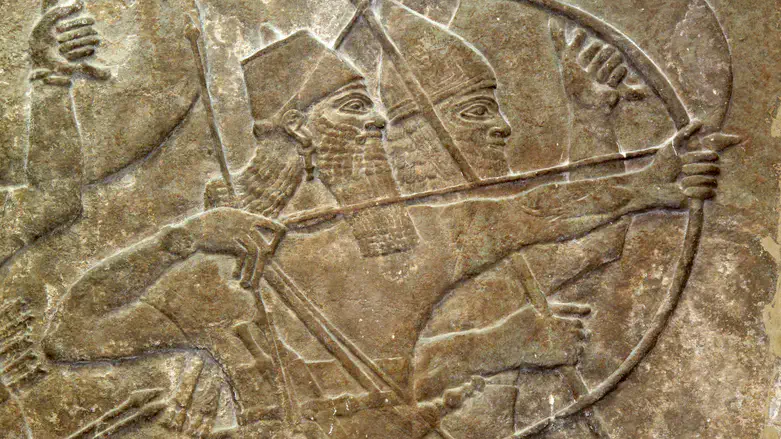
Dedicated in memory of Yaakov ben Avraham and Sarah Aharonov z"l
Efie Vogel is Director of Finance and IT at Torah Mitzion
Parashat Shoftim provides a cluster of Mitzvot concerning national laws, leadership, and the discipline of a state.
Among the many Mitzvoth are the instructions on how to prepare the armed forces before going to battle:
"וְאָמַר אֲלֵהֶם שְׁמַע יִשְׂרָאֵל, אַתֶּם קְרֵבִים הַיּוֹם לַמִּלְחָמָה עַל-אֹיְבֵיכֶם; אַל-יֵרַךְ לְבַבְכֶם, אַל-תִּירְאוּ וְאַל-תַּחְפְּזוּ וְאַל-תַּעַרְצוּ מִפְּנֵיהֶם. כִּי ה' אֱלֹקיכֶם, הַהֹלֵךְ עִמָּכֶם לְהִלָּחֵם לָכֶם עִם אֹיְבֵיכֶם, לְהוֹשִׁיעַ אֶתְכֶם" (דברים כ' ג-ד)
"He shall say to them, “Hear, O Israel! You are about to join battle with your enemy. Let not your courage falter. Do not be in fear, or in panic, or in dread of them. For it is your G-d who marches with you to do battle for you against your enemy, to bring you victory.” (Deuteronomy 20, 3-4)
The lack of Linguistic-grammatical consistency in the pasuk, creates a need for commentary and Derashot.
- ואמר אליהם - He shall say to them - plural –
שמע ישראל - - singular.
The shift in the form of speech from plural to singular leads commentators to see in the words ""שמע ישראל not just a command but also a code, relating to the parshah of ""שמע ישראל referring to “"קריאת שמע -the daily practice of declaring our obligation towards God's sovereignty and authority over us.
In the parsha of שמע, we are told to love G-d with all our soul- (בכל נפשך)- even to the extent that we need to sacrifice our lives.
This prism leads to the expectation from us to overcome fear at war, because we are constantly obligated to surrender our subsistence if is required, and if a soldier is harmed during combat in the name of G-d or G-d’s nation, he is paying an expected price.
It seems this is the approach of Maimonides:
"...ומאחר שיכנס בקשרי המלחמה ישען על מקוה ישראל ומושיעו בעת צרה וידע שעל יחוד השם הוא עושה מלחמה וישים נפשו בכפו ולא יירא ולא יפחד ולא יחשוב לא באשתו ולא בבניו אלא ימחה זכרונם מלבו ... ואם לא נצח ולא עשה מלחמה בכל לבו ובכל נפשו הרי זה כמי ששפך דמי הכל..."
(מלכים פרק ז הל' טו)
"…Once a soldier enters the throes of battle, he should rely on the Hope of Israel and their Savior in times of need. He should realize that he is fighting for the sake of the oneness of God's Name. Therefore, he should place his soul in his hand and not show fright or fear.
And if his does not wage war with all his heart and soul, it is considered as if he shed the blood of the entire people"
(The Laws of Kings and their Wars, chapter 7, 15)
However, the Gemarah (Sotah 42) chooses an opposing perspective, the term:
""שמע-ישראל, is not intended to remind the fighters to be willing to become martyrs but on the contrary it comes to eliminate fear by reinforcing the belief that there is hope of returning home safely:
"אמר רבי יוחנן משום רבי שמעון בן יוחאי אמר ליה הקב"ה לישראל-אפילו לא קיימתם אלא קריאת שמע שחרית וערבית אין אתם נמסרים בידם"
"Said Rabbi Yochanan in the name of Rabbi Shimon Ben Yochai-G-d said to Israel, even in if you only fulfilled reading Shemah in the morning and evening you will not be in their control"
Rashi in his commentary on the Torah takes the optimism a step further and says- "כדאי אתם שיושיע אתכם"- you are worthy of G-ds redemption.
Can the two approaches be united and form a solidified statement?
I believe so. The Rambam is referring to the individual soldier, in war there will be casualties, and in the battle, a fighter needs to be aware of the reality he is confronting, but at the same time, he needs to be determined and properly perform in his military challenges. Therefore, he is obligated to overcome his natural fear of danger. This tremendously difficult task might be possible if the warrior reminds himself the objective of his action, the supreme motive for participating in combat. The combatant's willingness to sacrifice by paying a personal ultimate price is soothed by realizing that his actions are linked to the fate of his nation and an act of worship of the Creator.
The Gemara (and Rashi) writes from the national perspective. As long as Am Yisrael declares that G-d's rule and sovereignty is absolute, somehow Am Yisrael will overcome the time of despair. Like a phoenix, we rebuild from the ashes time after time. We outlived the difficulties of Egypt, Babel, the Greeks and Romans, Crusaders, Inquisition and Muslim Pogroms. The flourishing rebuild post Holocaust, is still a vivid reality.
I pray that we will soon see the blossoming through the darkness of the last few months and the difficult times we are presently facing.
Hoping that our constant announcing שמע ישראל ה' אלוקינו ה' אחד will be returned with G-d’s humming - מי כעמך ישראל גוי אחד בארץ
For comments: efie@torahmitzion.org